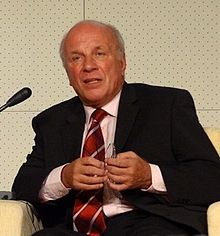Greg Dyke
| Greg Dyke | |||
|---|---|---|---|

Greg Dyke (2011)
|
|||
| Born |
Gregory Dyke 20 May 1947 Hayes, Middlesex, England |
||
| Alma mater | University of York | ||
| Occupation | Journalist, broadcaster, executive director | ||
| Title | Chairman of Brentford Football Club Chairman of the British Film Institute Chairman of HiT Entertainment Chancellor of the University of York |
||
| Predecessor | (BFI) Anthony Minghella (York) Dame Janet Baker |
||
| Spouse(s) | Susan Howes | ||
| Children | 4 | ||
|
|||
Gregory Dyke (born 20 May 1947) is a British media executive, journalist and broadcaster. He is the former chairman of The Football Association (FA). Dyke is a panellist on Sky News' The Pledge. Since the 1960s, Dyke has had a long career in the UK in print and then broadcast journalism. He is credited with introducing 'tabloid' television to British broadcasting, and reviving the ratings of TV-am. In the 1990s, he held chief executive (CEO) positions at LWT Group, Pearson Television and Channel 5.
He is most notable for his tenure as Director-General of the BBC from January 2000 to January 2004, a position from which he resigned following heavy criticism of the BBC's news reporting process in the Hutton Inquiry. He is the chairman of children's television company HiT Entertainment, and was the Chancellor of the University of York from 2004 to 2015.
Dyke was born in 1947, in Hayes, Middlesex, the youngest of three sons in a "stable, lower middle class" family. His father was an insurance salesman. The family lived at 17 Cerne Close until he was 9, then moved to Cedars Drive, Hillingdon. He was educated at Yeading Primary School and then Hayes Grammar School, which he left with one grade "E" at A-level mathematics. After school he was briefly a trainee manager at Marks & Spencer before leaving to work as a trainee reporter for the Hillingdon Mirror, becoming chief reporter in eight months. He left the Mirror after attempting to stage a union-backed protest against poor pay conditions by the junior staff of the work on the paper. He then got a job at the Slough Evening Mail. Amongst his colleagues was future music journalist Colin Irwin.
...
Wikipedia
